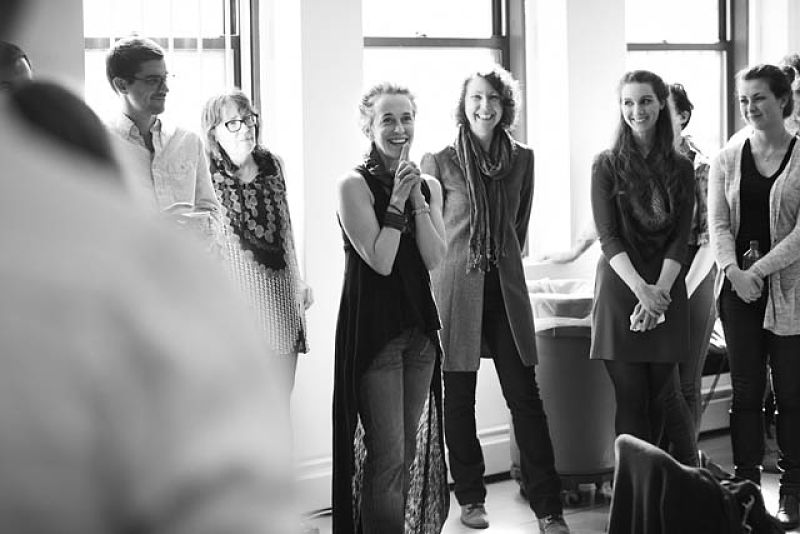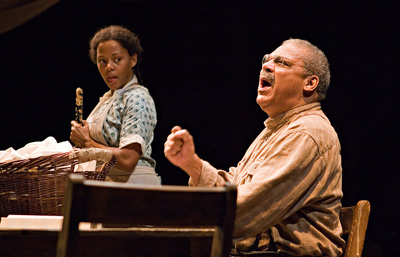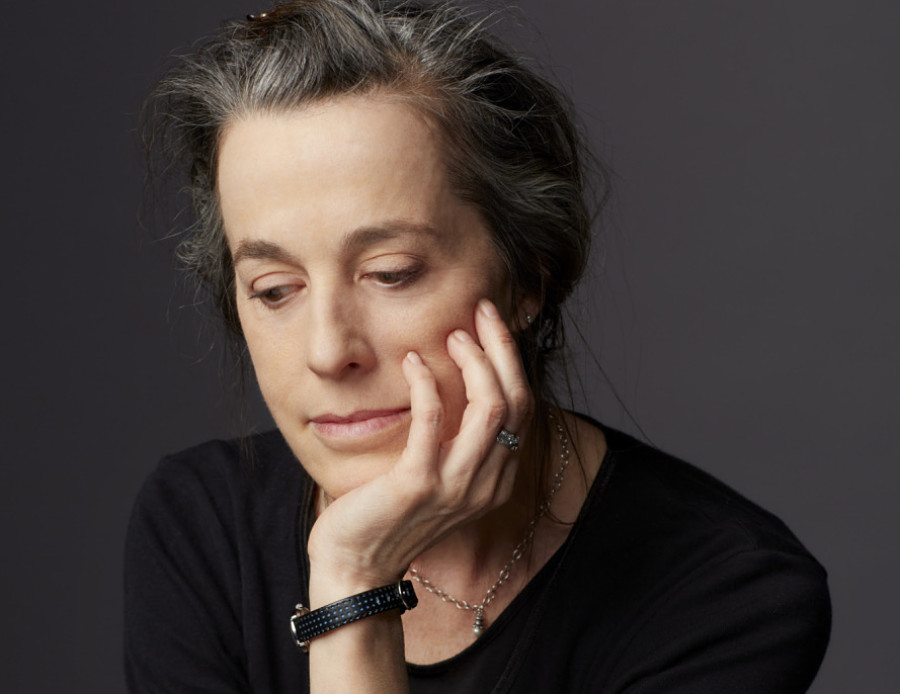Naomi Wallace is a playwright and screenwriter from Kentucky. Her plays have been produced in the United Kingdom, Europe, the United States, and the Middle East. In 2009, her 1995 play One Flea Spare was incorporated into the permanent repertoire of the French National Theatre, the Comédie-Francaise.
Wallace has won many awards and earned many grants and fellowships, including a genius grant from the MacArthur Foundation, the Susan Smith Blackburn Prize (twice), an Obie Award, and an Arts and Letters Award in Literature. Wallace is presently under commission by the Public Theater, Actors Theater of Louisville, and the U.K.’s Birmingham Repertory. She’s also in the midst of a season of her work at New York City’s Signature Theatre; her play Night Is a Room, directed by Bill Rauch, is currently running through Dec. 20.
Following are excerpts from an interview conducted by Joel Murray, chair and artistic director of Florida International University Theatre.
JOEL MURRAY: Annie Dillard wrote that writers should write like they’re dying. Does that mean anything to you?
NAOMI WALLACE: I tend to think such a statement encourages self-absorption. Especially when so much of the world is in actuality already dying through racism, war, poverty. Perhaps “write as though the lives of others depended on it”?
Dorothea Brande, in Becoming a Writer, refers to the unconscious side of the writer battling with the conscious side. Does that resonate with you at all?
Well, too much focus is on how to write and not why to write. To me, why we write is far more interesting, and answers to this question could be more dangerous.
There are a lot of “how-to” books out there.
Some of them are wonderful. It’s important to find ways to release our creativity.
When writing, do you have any difficulties with the “how?”
I still struggle with that.
What inspired you to begin writing plays, and what inspires you to continue to write?
I always wrote poetry, but it wasn’t until my late twenties that I started writing plays. And I think the main reason the theatre hooked me is that working with other people, making things together…is exhilarating.

The transition into dramatic form from being a poet—was that tough?
Yes. Handling formal elements is something I’ve been learning from various writers all my life. I studied O’Neill, trying to understand how he built his plays and steal some of his genius. More recently, I wrote a play that is roughly written in the form of a Shakespearian sonnet. One reason I decided on that form is because I feel the play is closer to my own life than most of what I’ve written. So I needed to keep the play on track by imposing a strict form. I’ve often found that the more restrictions I place on my form, the more freedom I have within those same restrictions.
You once spoke about how writers are often trained to go down deep into themselves, and that’s where an authentic voice is supposed to be found.
I think our voice and vision are forged by looking outward instead of inward.
What writers inspire you? What is it about them that keeps you reading?
I’d say reading history is at the core of my inspiration. My play Things of Dry Hours was inspired by Robin D.G. Kelley’s book Hammer and Hoe. The Liquid Plain came from a story in Marcus Rediker’s The Slave Ship. The sailor in One Flea Spare came from Rediker’s book Between the Devil and the Deep Blue Sea.
And of course I do read plays—you know, the “old” guys. The canon. (Laughs.) And then Brecht and Buchner. Muller, August Wilson, James Baldwin, Lorraine Hansberry, Adrienne Kennedy, and Kia Corthron have been inspirations. More recently, the Palestinian novelist Ghassan Kanafani. These writers all have moments of radical vision in their work. They each get to the root of social and political reality, and how this reality works intimately within human relationships.

Do you go into research with a purpose because you’ve already gotten the idea, or do you read something out of interest and the idea comes from that?
It can be either. Sometimes I’ll come across an incident in history, and I want to write a play about it. When I found Hammer and Hoe I discovered that the Alabama Communist Party was one of the few places in America in the 1930s where black and white people worked together. What we’re usually taught is that African Americans were mere dupes of the Communist Party, but some were phenomenal visionaries at the center of the Alabama Communist Party. And black and white people got together, and those who could read would teach those who couldn’t read. It could be a death sentence for black people to be meeting in groups with white people. These people chose to risk their lives to come together to form an interracial class and challenge the oppressive and racist economic system. Here you had the poorest people in Alabama dreaming of a different America—a more democratic country. The best elements of our democratic experiment come from the bottom, actually. From those who have the least.
Do you think writers should write about their obsessions?
I prefer to think of it as writing about our passions, and writing is to be of use to others. But hey, whatever paddles your boat as a writer.
As you’re writing, do you do a lot of note-taking and discarding and rewriting and rearranging?
It depends on the subject. I have a certain amount of research that I read and take notes on. Then along the way I start thinking of the characters. I kind of have something in mind but it usually comes from what I’m researching. And then I give myself a little break from the research, because the historical facts are things I can thread back through in a later draft in a play. In The Liquid Plain, for instance, Marcus Rediker sent me a glossary of words used during the 19th century. I went through the play and looked for places I could use these fresh, lively old words. But usually I map things out. I write on note cards. I’ll write what I think will be in the first act, what I think will be in the second act.
Are you a playwright who writes every day?
No. Though most days I am reading, planning, or rewriting. Things of Dry Hours probably took me the longest from research to page, because it was the first time I’d written a role for an African-American man. That took over four years. So after researching, what I’ll do is: I’ll get my notes and my note cards and map it out. And I will set aside a certain month if I have a first draft due, and I usually write it in anywhere from ten days to five weeks. I may write a first draft within a very limited time, but if you factor in the research and planning done beforehand, it’s not quick. I don’t do any of the actual writing until my research is complete.
And I write by hand. I like to have notebooks for writing the play. There’s something about the intimacy of pen or pencil and paper that I like and perhaps need. And I will go through that first draft and then I will, you know, add, subtract—scratching out, adding in—and then I can follow the map of those changes.
Sam Shepard once said that he will just start writing from a phrase or image or something that stimulates him. And 10 pages into it, if he likes it, he’ll keep writing. If not, he’ll just throw it in a pile.
I have never started a play and quit on it. I will discard scenes, of course; I discarded a whole act ofThe Liquid Plain. That was the first time I’d done that. Bill Rauch, whose theatre commissioned the play, said, “I love the play but I hate the third act. You don’t need it. Trust what you’ve already got.” And he was completely right. I’ve never just sat down and thought, I wonder what’s going to come out? I do not buy into the notion that we are not in control of what happens in our plays: “Well, it just happened without ideology; these people started talking and I wrote it down.” We all have our notions about how society should be run, about who we are. To pretend that the characters we put onstage have simply appeared engenders a kind of irresponsibility.
Richard Elmore, Kimberly Scott, and Josiah Phillips in “The Liquid Plain” at Oregon Shakespeare Festival in 2013. (Photo by Jenny Graham)
What about when you teach?
I will give students articles taken from the press and I will ask them to find a character in the article and write from that voice. I try to give the students material that I think might be outside of their immediate experience. And almost every time they end up feeling inspired. We all draw on our own experience to see through the eyes of another. I know there are things in my own life that are in my work. It’s just that those “things” are in other worlds now. Students of writing need to be encouraged to read. The command is usually to “write, write, write.” I suggest instead to “read, read, read.”
What about Aristotelian principles like probability and necessity?
I encourage new writers to study Aristotle’s Poetics. Once you learn the “rules,” you will better discover how to subvert them. I’ve seen the most radical, challenging plays embrace Aristotelian structure, and I’ve seen reactionary hogwash completely inverting that structure.
Do you consciously seek an objective of the play?
I’ve often stolen Heiner Muller’s idea and tried deliberately not to give the public answers but let them find their own. I develop a sense of what I want to feel from the play, and I develop the motion of the play and where it’s going, how it gets there, and what is to be revealed. I know that there is something the characters want, and so I know the feeling of the scene. I just may not know how to write it.
So you discover how to write it by a mix of, “Well, let me take some notes on this, let these guys talk a little more,” and so on?
Yeah. I might have a little synopsis of the scene, and then I might cut my characters loose and see how they get there. I might change the scene entirely, but what I’m trying to press is that I don’t start a play or scene saying, “Let me throw the dice and let me see where this goes.” I believe that I have as much freedom within the parameters of my plays as any playwright does—it’s just that none of us are free from ideology. I don’t think we can begin to break free until we realize our own restraints, many of which we’ve made invisible by believing this romantic notion that we start from nothing—that our characters are free and we have no politics circulating in our work.
Do you have any particular routines in the process of writing?
Yes. After researching, I give myself a few days to listen to music, read poetry, look at paintings—things that are more visual and aural. Then I write every morning for 10 days to 5 weeks for a first draft. I make myself write anywhere from 6 to 10 pages. Some people write a little bit every day for a very long time. I can’t do that.
Do you have readers?
One of ’em’s my partner, Bruce. He has an extraordinary mind. He has written dialogue into my plays. Kia Corthron is one of my readers, too, and her notes are always crucial. As for directors, if I believe they understand my work, I’ll write anything for them. Tony Kushner kept bugging me about this one section in In the Heart of America and finally I said, “Just write the dialogue yourself.” So he wrote a couple of lines into the script, and I was thrilled. I have always benefitted from the direct input of others. My best work has often come through the challenges created by other artists, directors, actors. If I were left to my own devices, my work would suffer.
What’s the most challenging part of the writing process for you?
The beginning. It’s tough thinking, I have nothing, not even a first word. It takes, I think, a kind of active faith or momentary insanity to believe that the play will come. Bruce recently pointed out to me that every time before I begin a new play I say, “You know, I just don’t think I can do this anymore.” So one day he says to me, “Naomi, you say the same thing every time you begin a new play.” And I realized, as the saying goes: Get off the cross, we need the wood. I feel incredibly privileged to be able to write plays.
A young playwright approaches you and tells you that s/he wants to write plays. What advice might you offer?
My experience isn’t necessarily any guide for another writer. If I were pressed, I would ask the young writer why s/he wants to write plays. I’m not interested in talking to young writers about “careers.” That’s a very corporate way of looking at the theatre. For me, writing is not only about writing. It’s about studying history and literature and art. It’s about giving a damn about the world around you. Being a playwright is about the lies we are still taught about our democratic project, whose strongest strains of democracy were envisioned and promoted by the most oppressed, not by the privileged. To write for the stage, to put words into the mouths of others, is not a “career.” But if you are lucky, it will be a dangerous undertaking. Truly radical theatre can change hearts and minds.
Thank you.
This was a conversation. It didn’t feel like an interview at all.
Thanks for sharing. You do wonderful things with your gift of writing. You are indeed a writer’s writer, and so a humanitarian in every sense of the word.
My pleasure. Thank you, Joel.



